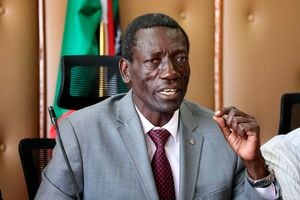
Gerald Kung'u Wamaitha at his shop in Kinoo on April 6, 2025. The 35-year-old Kenyatta University graduate abandoned his teaching career after frustration with getting a Teachers Service Commission appointment.
Gerald Kung’u Wamaitha felt like he had the whole world at his feet at 25 after graduating with a bachelor’s degree in Education in 2015. At Kenyatta University, he had specialised in mathematics and chemistry.
Despite being a fresh graduate, Mr Wamaitha’s experience set him apart from most peers as he had already taught in four schools, both primary and secondary, while pursuing his degree. The boards of management at Kahuho Secondary, Uthiru Girls’ High School, Kinoo Primary School and Bridge Schools had all given him a chance to teach.
A mathematics and chemistry whizz who also loves literature, Mr Wamaitha’s teaching dream was cut short by a demand for a Sh100,000 bribe in exchange for a Teachers Service Commission (TSC) posting.
After graduating, Mr Wamaitha proceeded with teaching through local arrangements with various schools’ boards of management.
“In some schools, I would be allocated as many as 37 lessons per week, against the usual maximum of 17. I realised that this was exploitation because I was doing all that work for at most Sh16,000 per month,” he said in an interview with the Nation.
During the 2017 teachers’ strike, he rose to become the headteacher of a Bridge school in Kajiado, still without a TSC posting. He had gotten the job through a recommendation from a Kenya National Examinations Council employee who was at the time based in Kikuyu town.
The official, whom Mr Wamaitha remembers only as Mr Ndung’u, had promised to help push for a TSC posting. The two lost touch after Mr Ndung’u left Kikuyu town.
Later on, a neighbour in Kinoo attempted to solicit Sh100,000 from Mr Wamaitha in exchange for a TSC posting. To date, he is not sure if the woman was a TSC employee. But he is certain that the solicitation contributed to the frustration that ended his teaching dream.
“She was not willing to get me the TSC letter and then allow me to pay her in instalments from my salary. I told her I did not have that kind of money and that was how it ended,” Mr Wamaitha added.
After resigning from the Bridge school, Mr Wamaitha took on casual jobs, particularly in the construction industry, where he would often be employed as a foreman. At that point, he realised that he was getting a higher net income than most TSC entry-level teachers, and certainly more than those employed on local arrangements with schools’ boards.
In 2019, he was able to get capital to set up a small shop a stone’s throw away from Mama Ngina Comprehensive School in Kinoo. He still operates the shop, and does some casual construction work. During the interview, customers come to his shop every few minutes, some calling him governor on account of his political ambitions.
“I gave up on teaching after my experience, and also learning that even some casual work gets more income than many teachers. I intend to join politics and in 2027 I think I will run for MCA. Maybe through politics I can do something to help aspiring teachers not to give up on their calling,” the 35-year-old said.
Open secret

Remarks by Murang’a Woman Representative Betty Njeri Maina (inset) have lifted the lid on an open secret regarding how TSC jobs are shared as political spoils.
Mr Wamaitha’s predicament in getting a TSC posting is not unique.
Last week, MP Betty Njeri Maina unwittingly blew the whistle on an issue that has been a public secret for several years— political and personal interests surpassing TSC’s powers in hiring teachers. She revealed that a group of 11 MPs allied to President William Ruto’s Kenya Kwanza administration were each given 20 teaching slots for their constituents.
State House spokesperson Hussein Mohamed was yet to return our calls or respond to text messages querying the political hand in hiring of teachers, which many a time works against individuals like Mr Wamaitha, who have for years waited for TSC postings.
In May, 2024 then Education Cabinet Secretary Ezekiel Machogu dished out TSC appointment letters to individuals during a burial ceremony in Bomachoge Borabu Constituency.
Just a few months earlier, South Mugirango MP Sylvanus Osoro had claimed that he was allocated 100 TSC letters to dish out to his constituents.

South Mugirango MP Sylvanus Osoro.
And the political and personal interests are not exclusive to education.
In the same burial ceremony where Mr Machogu issued TSC appointment letters, UDA officials were handing out Kenya Forestry Service appointment letters.
In March, 2024 Justice William Musyoka revoked the hiring of 1,406 revenue assistants that the taxman had hired, after finding that 56 per cent of the vacancies were allocated to members of the Kikuyu and Kalenjin communities. It was an open secret in the corridors of power that politicians and influential persons in the Kenya Kwanza administration shared out the slots, with some going out to their relatives and cronies.
Mr Peter Kabinga Orogo, who petitioned the court to revoke the appointments, questioned how Thika Town and Kiharu constituencies got 90 slots, which were more than what some counties got, such as Busia (13), Kisii (19) and Makueni (15).
Justice Musyoka criticised the respondents—the Kenya Revenue Authority (KRA) chairman, board of directors and commissioner-general— for failing to ensure regional balance in the appointments.
Mass employment
“A recruitment of 1,406 individuals in one exercise qualifies for mass employment. That would have been a perfect opportunity for the respondents to exercise a fair distribution of the available positions amongst members of all the ethnic groups in Kenya, proportionately, given that there were enough positions to go around,” Justice Musyoka said as he barred KRA from recruiting and appointing staff at all levels, until an ethnic diversity and regional balance policy is deployed.
Police and military recruitments have also become avenues for graft, with slots going to the highest bidder or those with powerful connections.
Former Kenya Defence Forces (KDF) soldier Fred Kiptum Kiplagat is serving a five-and-a-half-year sentence for receiving a Sh300,000 bribe to facilitate the recruitment of Brian Kipkemoi. Several individuals, civilians and military personnel, have over the years been implicated in similar schemes.
Ruben Ngige Muthoni was among those shortlisted during a 2023 KDF recruitment exercise in Ngong stadium, and was even issued with a confirmation letter asking him to report to the recruitment centre. His biometrics were captured, and Mr Muthoni surrendered his identification card with the expectation that it would be replaced with a KDF badge. He has never received any further communication, and his ID card is still in the hands of the military, two years later.
Mr Muthoni’s ordeal has sparked a parliamentary investigation after several MPs raised concerns about claims that many of those recruited did not take part in the recruitment process. The Defence and Foreign Relations Committee of the Senate has been tasked with the investigation.
Defence Cabinet Secretary Soipan Tuya recently said that the government is crafting a tamper-proof process for the recruitment of KDF personnel, a seeming admission that past exercises have been infiltrated by unscrupulous individuals.
Former Chief Justice David Maraga also exposed the rot in police recruitment when he led a President Ruto-appointed task force. The team found that some senior officials have been auctioning slots in the National Police Service (NPS) for as high as Sh600,000 each.
The cost and need for intimate connections to the NPS top brass has most often given an undue advantage to relatives and close friends of senior police officers, wealthy businessmen and politicians, the Maraga report revealed.










